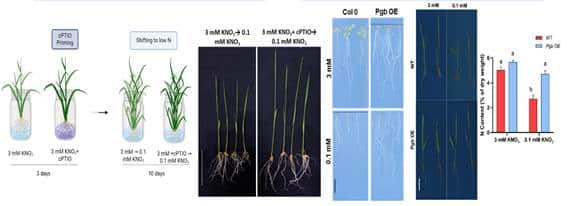Innovative Research Enhances Nitrogen Use Efficiency in Plants

In a groundbreaking study, researchers have discovered that reducing nitric oxide (NO) levels in plants can significantly enhance nitrogen uptake and Nitrogen Use Efficiency (NUE) in rice and Arabidopsis. This research, conducted by the National Institute of Plant Genome Research (NIPGR), opens new avenues for sustainable agricultural practices. By focusing on the modulation of NO levels, scientists aim to improve crop yields while minimizing the reliance on nitrogen fertilizers. This innovative approach could lead to more environmentally friendly farming methods, addressing critical issues related to food security and ecological sustainability.
Understanding Nitrogen Use Efficiency (NUE)
Nitrogen Use Efficiency (NUE) is a crucial factor in agriculture. It refers to how effectively plants utilize nitrogen, an essential nutrient for growth. Traditional methods to enhance NUE often involve the application of inorganic nitrogen fertilizers. These practices, while effective, come with significant drawbacks. They can lead to increased operational costs for farmers and contribute to environmental issues, such as the emission of nitrogen oxides (NOx) during fertilizer production. Excessive use of these fertilizers also contributes to global greenhouse gas emissions.
The recent study highlights a novel approach to improving NUE by focusing on the systemic regulation of NO levels in plants. By modulating these levels, researchers can influence the activity of high-affinity nitrate transporters (HATs), which play a vital role in nitrogen uptake. This method diverges from traditional practices, offering a more sustainable solution to enhance crop yields while reducing nitrogen inputs. As the world faces challenges related to food security, this research provides a promising pathway for developing more efficient agricultural practices.
The Role of Nitric Oxide in Plant Growth
Nitric oxide (NO) plays a pivotal role in regulating various physiological processes in plants. It is involved in the activation of high-affinity nitrate transporters, which are crucial for nitrogen uptake, especially under low nitrogen conditions. The recent study by NIPGR demonstrated that by manipulating NO levels, researchers could enhance NUE at a systemic level. This manipulation involves both pharmacological and genetic approaches to regulate NO levels in plants.
The research team, led by Dr. Jagannath Swain and Dr. Jagadis Gupta Kapuganti, implemented a pharmaceutical strategy. They treated wild-type plants with an NO donor (SNAP) and an NO scavenger (cPTIO) to monitor changes in NUE. The results showed that overexpressing phytoglobin, a natural NO scavenger, increased the expression of high-affinity nitrate transporters like NRT2.1 and NRT2.4. This led to improved nitrogen uptake, particularly in low NO conditions. By understanding the role of NO in plant growth, researchers can develop innovative strategies to enhance NUE and promote sustainable agriculture.
Future Directions in Nitrogen Management
The findings from this study pave the way for future research in nitrogen management. The team at NIPGR is exploring the potential of developing novel NO scavenging formulations that can be applied across various agroecosystems. These formulations aim to improve NUE and reduce the need for nitrogen fertilizers, ultimately benefiting both farmers and the environment.
Additionally, the researchers are investigating the possibility of identifying specific bacteria that can act as NO scavengers when introduced into the soil. This approach could further enhance nitrogen utilization in plants, leading to increased crop yields without the environmental costs associated with traditional fertilizers. As the agricultural sector continues to seek sustainable solutions, this research represents a significant step forward in addressing the challenges of food production and environmental sustainability.
The innovative research conducted by NIPGR offers a promising pathway for improving Nitrogen Use Efficiency in plants. By focusing on the modulation of nitric oxide levels, scientists are paving the way for more sustainable agricultural practices that can help meet the growing global demand for food while protecting the environment.
Observer Voice is the one stop site for National, International news, Sports, Editor’s Choice, Art/culture contents, Quotes and much more. We also cover historical contents. Historical contents includes World History, Indian History, and what happened today. The website also covers Entertainment across the India and World.
Follow Us on Twitter, Instagram, Facebook, & LinkedIn

